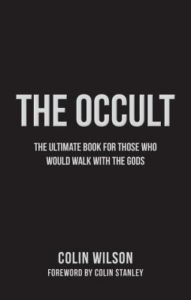The Occult: A History is a classic guide to the occult written in 1971 by English writer Colin Wilson.
Topics covered include Aleister Crowley, George Gurdjieff, Helena Blavatsky, Kabbalah, primitive magic, Franz Mesmer, Grigori Rasputin, Daniel Dunglas Home, Paracelsus, P. D. Ouspensky, William Blake, Giacomo Casanova, Heinrich Cornelius Agrippa, and various others.
The Occult: A History is divided into three sections:
- Part One is entitled “A Survey of the Subject” and covers topics such as “Magic-The Science of the Future”.
- Part Two is titled “A History of Magic” and covers occult in history.
- Part Three is called “Man’s Latent Powers” and deals with topics such as spiritual entities in the chapter “The Realm of Spirits”.
A few quotes:
Religion, mysticism and magic all spring from the same basic ‘feeling’ about the universe: a sudden feeling of meaning, which human beings sometimes ‘pick up’ accidentally, as your radio might pick up some unknown station. Poets feel that we are cut off from meaning by a thick, lead wall, and that sometimes for no reason we can understand the wall seems to vanish and we are suddenly overwhelmed with a sense of the infinite interestingness of things.
p. 28
Faculty X is simply that latent power in human beings possess to reach beyond the present. After all, we know perfectly well that the past is as real as the present, and that New York and Singapore and Lhasa and Stepney Green are all as real as the place I happen to be in at the moment. Yet my senses do not agree. They assure me that this place, here and now, is far more real than any other place or any other time. Only in certain moments of great inner intensity do I know this to be a lie. Faculty X is a sense of reality, the reality of other places and other times, and it is the possession of it — fragmentary and uncertain though it is — that distinguishes man from all other animals.
p. 59
Christianity was an epidemic rather than a religion. It appealed to fear, hysteria and ignorance. It spread across the Western world, not because it was true, but because humans are gullible and superstitious.
p. 212
Connect with Beyond Motivation:The real importance of Swedenborg lies in the doctrines he taught, which are the reverse of the gloom and hell-fire of other breakaway sects. He rejects the notion that Jesus died on the cross to atone for the sin of Adam, declaring that God is neither vindictive nor petty-minded, and that since he is God, he doesn’t need atonement. It is remarkable that this common-sense view had never struck earlier theologians. God is Divine Goodness, and Jesus is Divine Wisdom, and Goodness has to be approached through Wisdom. Whatever one thinks about the extraordinary claims of its founder, it must be acknowledged that there is something very beautiful and healthy about the Swedenborgian religion. Its founder may have not been a great occultist, but he was a great man.
p. 280

